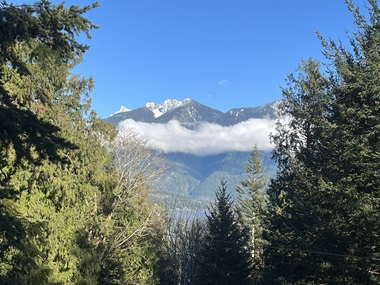
Care for creation is widely shared by most Vancouver residents.
Over the last several years, I have worked as a researcher through St. Andrew’s Hall where I serve as Dean, exploring the nature of Christian communities in the city of Vancouver and how they interact with the wider, more secular culture here on the West Coast.
A part of my research involved surveys and interviews with pastors, and some of the most interesting work included focus groups in 14 different communities of Christian faith in the city. One of the questions in my interview guide for laypeople included this curiosity:
In your experience, describe what values or beliefs Vancouverites have in common, whether they are Christian or not.
While there was a wide-ranging response in the different groups that represented church plants, mainline Protestant, multi-site evangelical, ethnic specific, neighbourhood focused and Roman Catholic / Orthodox perspectives, one theme that continued to emerge was the shared value regarding care for the planet and appreciation of nature as a place of wonder.
This value expressing a deep sense of care for nature, or what Christians would call a theology of creation, has been noted by others who study religion in the region. For example, Douglas Todd at the Vancouver Sun called environmentalism the “civic religion” of the area, while University of Victoria scholar Paul Bramadat coined the phrase “reverential naturalism” to describe the default setting of locals when they hike North Shore mountains or kayak on the False Creek.
While interview subjects reported how they struggled to articulate their Christian faith in a ‘spiritual but not religious’ culture like Vancouver, care for the natural world was an easier topic to engage their “affable agnostic neighbour.”
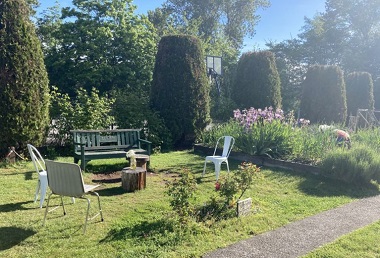
The Garden of Eatin’ at Vancouver First Christian Reformed Church. UGM photo
One participant noted:
There is a common desire to be ‘green’ and reduce our carbon footprint. This translates on the local level in Vancouver to shared urban gardening, the preference by many for public transit or electric vehicles, composting and recycling and a civic pride on public space such as parks (including Stanley Park), beaches and hiking in the North Shore Mountains.
As focus groups noted this place of connection with neighbours, what Canadian philosopher Charles Taylor calls “overlapping consensus,” many wondered how the church could further engage others in this shared area of concern.
“The church needs to find a way of saying why we care about things like recycling, to speak about God’s love and God’s creation as our motivating factors for involvement,” reflected one participant. What are the examples you have seen of faith communities effectively engaging in public theology in Vancouver that engenders care for Creation across diverse constituencies?
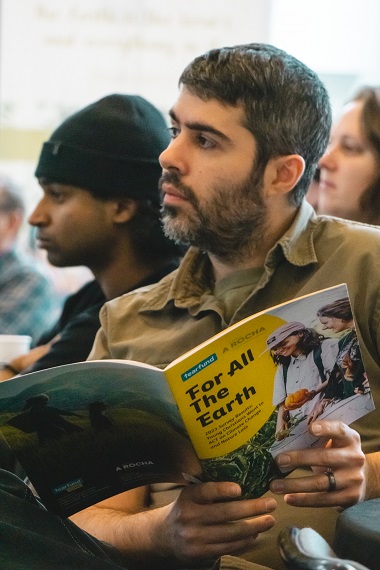
A Creation Collective survey released last spring revealed that most “young, church-going Christians see the care for creation as a gospel issue and are eager to see the church take leadership.” Participants at the Tenth Church presentation. Photo: Dannie Piezas (A Rocha Canada)
For some of those interviewed, this approach of engaging neighbours and their environmental concerns seemed like the most obvious mission approach available to Christians in the region.
One participant said:
The environment is easy to connect with here in Vancouver – creation care is so important to believers and non-believers. We’re stewards of God’s creation, and we’ve been entrusted to care for it.
So, our goal is the same with non-Christians and here is where our commonality comes from, the opportunity to both share the gospel and ask where does yours come from? They may or may not have an origin story of why they care about the environment, but it is a shared value and an opportunity to share faith.
Focus groups across denominational lines also made the connection between care for the environment and the growing awareness of the need for reconciliation with Indigenous peoples, often with a sense of humility when it came to how Christians engage these issues.
One participant suggested,
The way that we engage Indigenous culture, and the broader environmentalism movement is to listen and give others a voice in the church. Too often historically the church was keen to speak on behalf of others with a uniform voice – we need to let go of our own pride and ego. Christians need to acknowledge we are no longer in control, and we can see God at work in others.
This posture of humility and openness to hearing from other perspectives appeared repeatedly throughout the research and led to further questions on how Christians might share their faith with others as a result.
As leading Indigenous scholar Ray Aldred of Vancouver School of Theology notes:
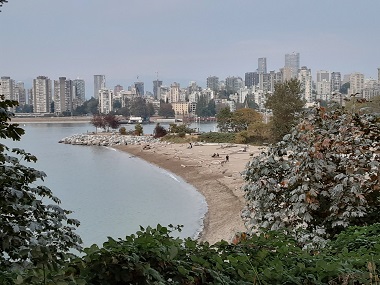
Squamish Nation residents of Sen̓áḵw village were forced to leave their home just over a century ago.
A people closely connected with the earth help define a spiritual way of living that is thoroughly grounded within the here and now. This moves spirituality and perhaps ‘religion’ out of the category of the private inner world and into the public real world. Indigenous peoples have this ‘earthly’ spirituality that is situated in the land and is simply living in a good way in all my relationships.
How might this turn from interior faith to a more public theology impact Christian witness in Vancouver?
While care for creation emerged as a significant theme, clarity was often lacking within focus groups on how much (or how fast) to focus on the topic. Some of the interview subjects expressed their impatience with how churches failed to make the connection regarding the environment, connection with neighbours and the opportunity to witness.
One person said:
Talk is cheap. Action matters. How can we reduce our carbon footprint and where are the Christian organizations making a difference? What would it look like to have the whole church take a day and have a collective clean-up of the neighbourhood?
In light of these conversations, it is clear that West Coast Christian communities face challenges of how to articulate a distinctively gospel-based concern for the world, as well as demonstrate what a faith-based response looks like that finds common ground with those around them.
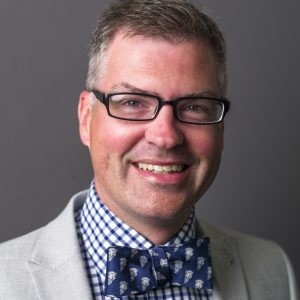
Ross Lockhart is Dean of St. Andrew’s Hall on the UBC campus.
Questions remain for those who engage this work such as:
- How might Christians in Vancouver more effectively engage their non-Christian, and often secular, neighbours on these shared matters of concern such as environmental care and Indigenous reconciliation?
- What new learning might emerge as we cultivate and curate spaces for discussion and learning together?
- What action might flow from such encounters as care for the planet and all of God’s creatures grows in urgency in the months and years ahead?
Dr. Ross Lockhart is Dean of St. Andrew’s Hall, the Presbyterian Church in Canada college at the University of British Columbia. His research will be published later this year by McGill-Queen’s University Press.
